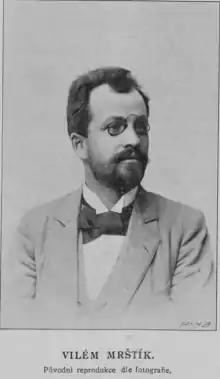Vilém Mrštík | |
|---|---|
 Vilém Mrštík (1897) | |
| Born | 14 May 1863 Jimramov, Moravia, Austrian Empire |
| Died | 2 March 1912 (aged 48) Diváky, Moravia, Austria-Hungary |
| Resting place | Diváky |
| Occupation | Writer, dramatist |
| Language | Czech |
| Nationality | Austro-Hungarian |
| Literary movement | Naturalism, Realism |
| Notable works | Maryša Santa Lucia |
| Relatives | Alois Mrštík, brother |
Vilém Mrštík (Czech pronunciation: [ˈvɪlɛːm ˈmr̩ʃciːk]; 14 May 1863 in Jimramov – 2 March 1912 in Diváky) was a Czech writer and dramatist.
Career
He is known for his novel Santa Lucia (1893). With his brother, Alois (1861–1925) he also wrote the drama Maryša (1894). This play, set in rural Moravia, explored gender roles and tradition in a small village. In contrast to the more positive renderings of rural life by the writers of the National Revival, the brothers attempted a more impartial view of life in the countryside.
He is also famous for having fought against the mass destruction of historic buildings carried out as part of urban renewal plans for parts of Prague by publishing two influential essays: Manifest to the Czech People (1896), and Bestia triumphans in 1897.
Works
- Paní Urbanová (Mrs Urbanová) 1889, drama
- Santa Lucia 1893, novel
- Obrázky (Pictures) 1894, anthology
- Maryša 1895, drama, written with his brother, Alois Mrštík
- Pohádka máje (A May Tale) 1897, novel
- Anežka (Agnes) 1912, drama
References
External links
 Media related to Vilém Mrštík at Wikimedia Commons
Media related to Vilém Mrštík at Wikimedia Commons Works by or about Vilém Mrštík at Wikisource
Works by or about Vilém Mrštík at Wikisource